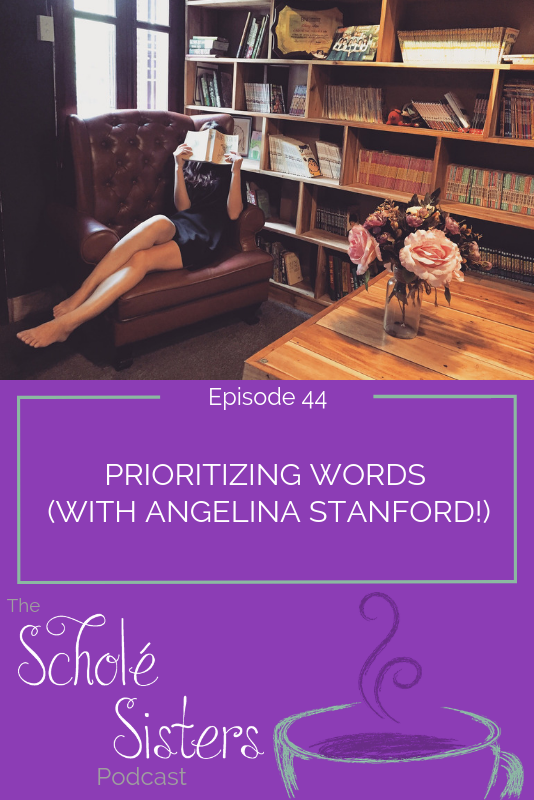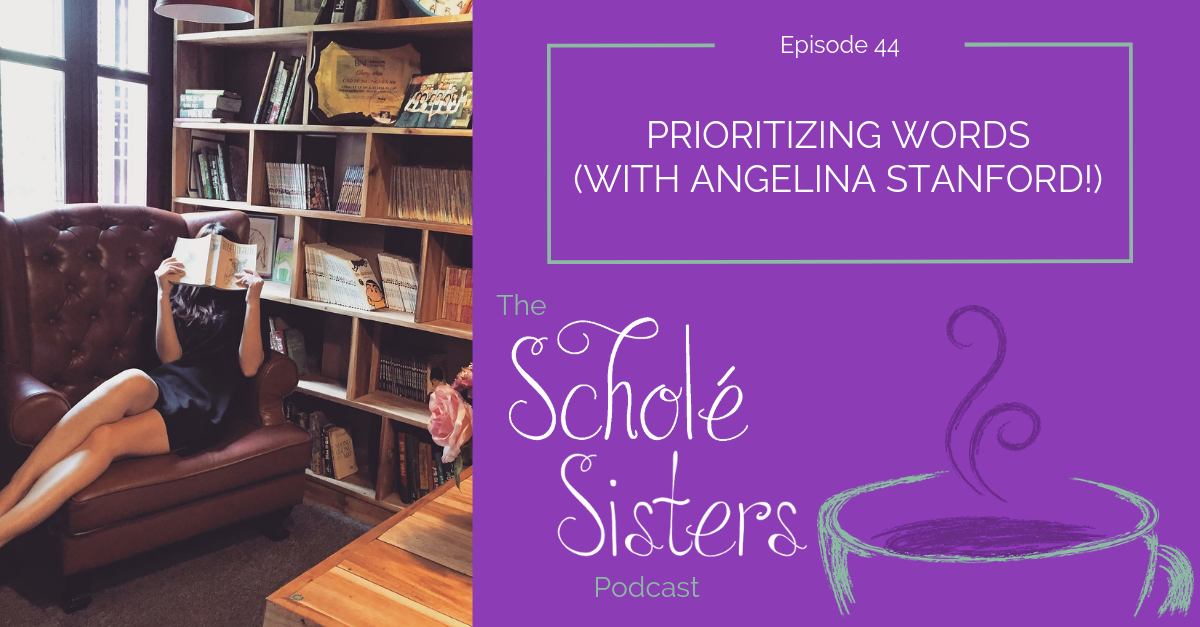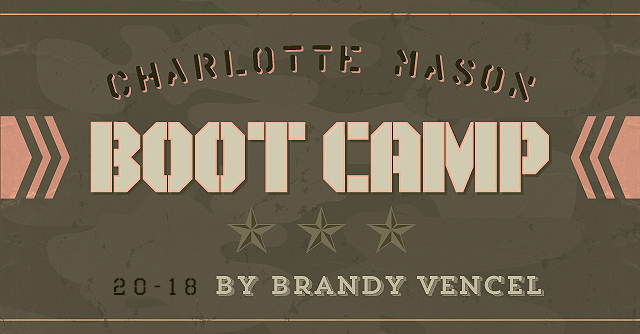SS #44: Prioritizing Words (with Angelina Stanford!)
Our guest today is Angelina Stanford! Angelina Stanford has a Master’s degree in English literature and has been teaching, writing, speaking, and training teachers for over 20 years. She is the co-star of the popular Close Reads podcast, as well as the new Shakespeare podcast, The Play’s the Thing. You can find Angelina at her website where she teaches class for middle school, high school, and adults. And look for her upcoming book, How to Understand Every Story: From Greek Gods to Superheroes, coming out next year.
Have you ever wondered why books are such a big deal in classical education? Wouldn’t it be easier to just pop in a movie and be done with all the lesson planning? It’s an interesting question, and Angelina Stanford, true to form, stood on her soapbox while giving Mystie and Brandy her answer. It was great.

Thank you to our sponsor:
This episode is sponsored by Charlotte Mason Boot Camp. Want to whip those Charlotte Mason muscles into shape? This intense, 6-week Charlotte Mason Boot Camp does just that! It’ll take that philosophical flab and turn it into nothing less than confidence. It’ll give you all the growing, stretching, and strengthening you’ve been looking for. There are three sessions of Charlotte Mason Boot Camp per year: spring, summer, and fall. To get on the interest list, click here and sign up!
Listen to the podcast:
Podcast: Play in new window | Download
Show Notes:
- Scholé Every Day
- Mystie
The Four Cardinal Virtues by Josef Pieper
- Angelina
Heroides by Ovid
- Brandy
Finish: Give Yourself the Gift of Done by Jon Acuff
- Mystie
- Topical Discussion: Prioritizing Words
- Charlotte Mason quote:
“People are naturally divided into those who read and think and those who do not read or think; and the business of schools is to see that all their scholars shall belong to the former class; it is worth while to remember that thinking is inseparable from reading which is concerned with the content of a passage and not merely with the printed matter.” Vol. 6, A Philosophy of Education, p. 31 Robinson Crusoe
- Rudyard Kipling
- Aeneid
- Anne White’s Guide for Plutarch
- Charlotte Mason quote:
Please leave us a review in Apple Podcasts!
If you upgraded to iOS 11, you’ll find leaving a review easier than ever. Just go to Scholé Sisters in your subscriptions and scroll down.







Why do you feel the need to cut other homeschoolers down? We love Classical Conversations, have you been involved in a community? It is not only memorizing history sentences. I’m sorry to unsubscribe, but This world is full of enough biased opinions that divide instead of being together.
I wasn’t aware that someone mentioned Classical Conversations.
It is my hope that classical education, being philosophical in nature, would make us able to face opinions with disagree with courage and honesty. It isn’t cutting anyone down (and no one was named, right? It’s not like Classical Conversations invented the memorization of history facts.) to state honestly that history sentence memorization is not and never has been part of the traditional classical practices: that is merely historical fact.
Wow, this episode was so encouraging and helpful for me. As a mom at the very beginning of the home school journey, it’s refreshing to hear how the little things we’re doing now (reading Bible stories and poetry) contribute to the long term hopes I have for my children and their education. This was a super episode that I will probably end up listening to again. Thanks!
Yes! All those little things are cultivating their affections, even when they are tiny! ♥
I loved this conversation! Now I’m left considering what a language-centered education looks like. I am definitely inspired to pull out more of those fables, fairy tales and myths for my elementary children!
One question I do have is, how does summarizing difficult language for the child fit in with the process of narration? Can there be both adult summarizing and child narrating?
I had the same question – do you invite the hipster to narrate and then add your summarizing if they struggle? I’ve been going with the “just take what they give you and leave it at that” approach but this seems to be helpful when my chjildren are completely lost.
I really appreciated the perspectives offered in this podcast! It helped to clarify some of the reasons I have felt conflicted when we orient our homeschool around history rather than language. I’d also love to hear your response to Lindsey’s question above about summary to help children understand hard books. I’m also curious to where you would point as a comprehensive list of the “best books” and how y’all would envision a more literature centered curriculum? It makes sense but practically I wonder if parents have a harder time feeling like they can structure and quantify what they are doing and therefore maybe tend towards history centered approach. Do you see AO’s yearly list of required literature texts as being the “best books”? Or are those a set of guidelines and are the book selections there ones that can be varied as long as we are still choosing from the “best books” and from challenging books? I’m just speaking of the literature sections of the list. Maybe it’s my particular ages/stages and the fact that I have all girls but in years 4/5/6 all the specific literature selections have not been as appealing to us as some of the books on the recommended reading list for the year. 🙂
This was such a thought-provoking conversation. Honestly it never even occurred to me to question whether basing homeschool education on history cycles was a good thing or not. Can you elaborate on this point a little? Where do we look for examples of language-based education as opposed to history-based education? Is AO a good place to start? Or maybe Pam’s morning time sets? I think I understand the reasons why we would want to be language based but it seems that SO MUCH curriculum is based on history. I would love some examples of how to do education that is language based.
I wanted to say also that for me it was very helpful to hear the “why’s” of the importance of reading in education. I love reading and so we’ve always used a literature-based curriculum, but that has always seemed like a flimsy reason to be book-based. “Mom likes books so we read lots of books.” Surely I can do better than that? This conversation encouraged me so much with reasons why reading the good and great books is important, even vital, to the education of my children. And let’s face it, this education is not just for my kids; I still have so far to go with my own education.
Just wanted to say that this was a really great episode, ladies! A lot of great points were made that I really appreciated and it was so encouraging to hear teaching our kids how to learn is more important than knowing facts or memorizing dates.
I loved this episode! Thanks for always being willing to tackle the tough stuff in loving ways, ladies! 🙂 Also… thanks for kindly kicking my butt about Robinson Crusoe… I suppose I will try again! <3
This podcast gave me a lot to ponder. I echo what previous commenters have asked: just what does a language-centered versus history centric education look like? So much out there is based on history (e.g. Well Trained Mind, etc). I’ve seen it said so many times that if you don’t do the history books of AO, then “it all falls apart” as the reading lit is based on the history. So does that mean AO is history-centric (even though it definitely has the high quality literature component in it)? What would be examples of a lit-based education? I’d love to hear y’alls’ opinion. 🙂
So much to think about. Thank you, Angelina Stanford!
Wow! I came here to say that I loved this episode, but I’m loving the discussion in the comments even more.
If my two cents are worth anything, I think one idea to consider is that history and literature can’t be separated as if they were worlds apart. I don’t think the options are “history based curriculum” OR “literature based curriculum” and never the two shall meet! Clearly a literature based curriculum will need much historical input to even be understood (for example, how much more interesting is it is read Austen’s Northanger Abbey after you have an understanding of the gothic novel resurgance happening in Regency England at the tim?. Without this historical understanding the humor in the novel can fall a little flat). Historical context is critical to understanding the literature of the ages. So I don’t think anyone is saying “let’s ditch history and only read good books”, but rather, let’s use good literature to spur on our understanding of history in a way that will really connect us back to the text, making it’s rich thoughts come alive in a deeper way and broadening our understanding of how ideas have evolved through the ages. If you want to understand the historical culture of a time period, look at its soul: art, literature, music! Literature will not only help us intepret history, it will also give us the skills to interpret and critique our own cultural circumstances.
On the other hand, a history based curriculum that swaps things like documentaries for reading the original texts or encourages fact memorization to the point where there is no time to read excellent literature will leave a person with a good idea of dates but not much else. The point is that ideas are transmitted through language, not dates, and that language is best learned through reading excellent examples of language and not by committing swaths of random sentences to memory (although I don’t deny the usefulness of knowing the facts in certain circumstances…the point is what good are facts if you don’t know what to do with them? Literature can help us know what to do–and not do–with the facts….a much more useful skill.)
Practically speaking, I would assume this looks like placing far more of an emphasis on literature than memorization of facts. Pitting history against literature is absurd…you can’t have one without the other. But pitting fact memorization against literature puts the distinction in a clearer view. Is it better for Sally to read good books and learn how to think big thoughts and learn new ideas? Or is it better for Sally to know all the dates? I loved Angela’s suggestion to slow down and savor a few books rather than rushing through a list. Again, if the goal is to learn how to appreciate language and develop brains that can understand ideas, then taking time to really understand a great work of literature is going to go a long way. Maybe this practically looks like keeping your current history based curriculum but dedicating morning or evening time to slowly reading and understanding some great book.
Pardon the length of this, I think I was partly working out my own thoughts about this episode. I really enjoyed the discussion. Thank you for having Angela on, her words were very encouraging!
Thanks for this refreshing, challenging and insightful conversation. Angelina’s take on a history-based curriculum made me stop and think. I will think about that for a long time. When I looked back at what my kids have read in AO1-5 so far, I am interested to see literature that didn’t align with history, with exceptions being Little Duke, Children of the New Forest, Robinson Crusoe, and Oliver Twist (many of which would be on a good books list anyway, not just “historical fiction” for the sake of historical fiction, which I understand is Angelina’s point.) I am challenged to reconsider my position on reading aloud (currently only a tiny bit and not for scheduled school books for competent readers) and strengthened to embark on Plutarch and “full” Shakespeare. I really do want more than checking all the boxes and getting it all done. BTW I did look around and find my sisters, then I moved interstate. But I am still connected to my far-away sisters in a Skype CM Volumes Book Club.
Angelina really got me thinking about the history-based issue as well. I’d really like to have her back on and discuss it further!
Great discussion, thank you! I am a second generation homeschooler and my education was heavily based in classic literature and that is where my passion is. However, my brother-in-law (also home schooled) posed a question the other day that I’ve been mulling over and this podcast increased my desire for more insight on it as well. The question in a nutshell is: are classically trained kids keeping up with/staying ahead of the curve in mathematical and scientific advances as well as historical and literary pursuits? He asked my thoughts on whether classic literature serves a technologically advanced society as well as it did the agricultural ones from which it primarily stemmed? There’s no question in my mind that a literary focus and heavy emphasis on language and reading are the great tools upon which the ability to learn is acquired. My question is – does that translate into the ability to learn the more technical fields as well? For instance, I can read CM or Josephus etc. with ease, but struggle to read the newspaper or a set of directions! I can explain a literary passage, but am JUST keeping up with my third grader in math! I aced every college paper I ever wrote but struggled with Greek for lack of technical grammatical terms in English (because I learned grammar through reading, not rules). My tendency has always been to assume I’m just personally “stupid” in those areas/one-sided in my ability. When I listen to homeschool podcasts, however, I do find most of the speakers are of the literary/historical/philosophical fields. I would love to spend our days just reading good books – but will that provide the necessary skills for my son who says he wants to be an engineer? How would you answer my brother-in-law? Are we homeschooling educators well rounded enough? Is academic balance being achieved in what you observe from kids who have graduated from a classical education? Is the result that they just naturally blossom in all fields of study? I don’t have enough exposure to the culmination of the high school years to answer that. I’m fortunate because my public-schooled husband (while he struggles with classic literature and some of the things at which I excel) can decipher a technical text, teach advanced math, understand systems and physics, and fix computers, as well as ace grammatical rules and keep up with all of the literary/reasoning skills that go along with being a full-time minister. Because of that I feel my kids have a chance of being well-rounded. Without that fallback, though – what’s the homeschooling mother to do?
Homeschool mothers don’t have to be one-woman shows. Outsourcing can be expensive with online classes, but it is possible. But so is teaming up with another family or two or even outsourcing just math to a school or tutor – like we do with piano or other instrument or sports.
I am always aware of my weakest areas and making sure I have safe guards in place to mitigate passing those on to my kids. This means that my husband took over math two years ago when my oldest passed me up. He is 15 and doing precalculus. Math is a language and does need to be studied consistently to be able to excel in technical fields. It’s easy to drift in math because of the strain its difficulty and challenge can be on a mother/son relationship. It is possible to help our kids become well-rounded, but it will never happen by taking the easy path or by accident.
As I spend more time around public schoolers I realize just how little history they are getting. It seems homeschoolers may be some of the few still learning any history. I would hate the baby to be thrown out with the bath water. Memorizing is not history – the story is the thing and there are numerous rich characters and ideas to mine in well written texts. I do think 3 or 4 years is running through history – slowing down is key. I agree with the poster above about thinking about it as humanities – history, lit, art all together. Thanks for always proposing thoughtful viewpoints.